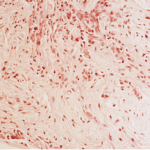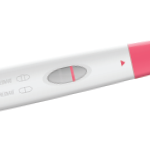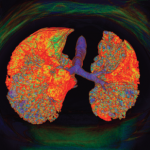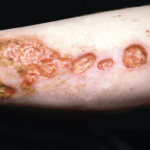For patients with gastrointestinal (GI) manifestations of scleroderma, the effect on quality of life & longevity can be dramatic. But advances are being made in the diagnosis & treatment of these patients…

Race May Not Be a Risk Factor for Giant Cell Arteritis
Past research has identified being of Northern European descent as a risk factor, among others such as age, sex and HLA DRB1, for developing giant cell arteritis (GCA). But new research casts doubts on this idea, finding that rates of biopsy proven GCA may not differ by race…

Research Sheds Light on Scleromyxedema, a Rare Skin Disorder
Scleromyxedema is a rare, mucinous skin disorder of unknown origin, one of a number of conditions that mimic systemic sclerosis. Although cases of scleromyxedema remain rare, a better understanding of its mechanisms of action could have implications for the research and treatment of scleroderma and related autoimmune conditions, says Laura K. Hummers, MD, ScM, co-director…

Study Says Mothers’ Cardiovascular Health Is Linked to Pregnancy Outcomes in Lupus
A recent study in The Journal of Rheumatology sheds light on the importance of preconceptional cardiovascular health in women with systemic lupus erythematosus. Although many questions remain, improved cardiovascular health measures seem to positively affect pregnancy outcomes, suggesting a potential role for preconception cardiovascular interventions.1 Women with lupus now have healthier pregnancies than in the…

Insights into Interstitial Lung Disease in Rheumatoid Arthritis Patients
MADRID—Rheumatoid arthritis (RA) is among the most common autoimmune diseases in the U.S., affecting approximately 1.3 million U.S. adults.1 Although tremendous treatment advances have been made in recent years, one extra-articular manifestation of RA that continues to pose a challenge with regard to detection and management is interstitial lung disease (ILD). At the 2019 European…

Researchers Seek the Best Methods to Maintain Remission in Vasculitis
MADRID—During the 2019 European Congress of Rheumatology (EULAR), held June 12–15, speakers addressed the complexity of vasculitis in a Challenges in Clinical Practice session titled, How to Maintain Remission in Vasculitis. Although vasculitis appears in many varieties, one commonality exists among these related yet distinct conditions: When there is vital organ or systemic involvement, disease…

Study Examines How Depression Subtypes May Stem from Osteoarthritis
People with or at risk for symptomatic knee osteoarthritis (OA) may be assigned to four depression subtypes with distinct clusters of depressive symptoms that may affect pain and disability over time, according to a new study in Arthritis Care & Research.1 Four depression subtypes were identified in the study using the Center for Epidemiologic Studies…

Study Finds ANA-Negative Classification Errors Among Newly Diagnosed Lupus Patients
How laboratories define a serological hallmark of systemic lupus erythematous and which assays they use to detect it could contribute to misclassification of patients identified as anti-nuclear antibody (ANA) negative, according to researchers. Most people who have lupus test positive for ANAs as part of an immunology screening for autoimmune disorders. The presence of ANAs…

Study Implicates Epstein-Barr Virus in 7 Autoimmune Diseases
The identification of specific transcription factors linked to the Epstein-Barr virus (EBV) provides new information on the molecular mechanisms underlying the link between EBV and autoimmune disease. A recently published study, “Transcription Factors Operate Across Disease Loci, with EBNA2 Implicated in Autoimmunity,” co-led by John B. Harley, MD, PhD; Leah C. Kottyan, PhD; and Matthew…

How to Improve Opioid Prescribing in an Outpatient Clinic
More than 72,000 Americans died from opioid overdoses in 2017, according to the National Institutes of Health.1 The impact of the opioid epidemic has affected many levels of patient care and, as a result, healthcare systems are responding to escalating death rates, new legislation and the possibility of compromised patient safety in a multitude of…
- « Previous Page
- 1
- …
- 119
- 120
- 121
- 122
- 123
- …
- 352
- Next Page »